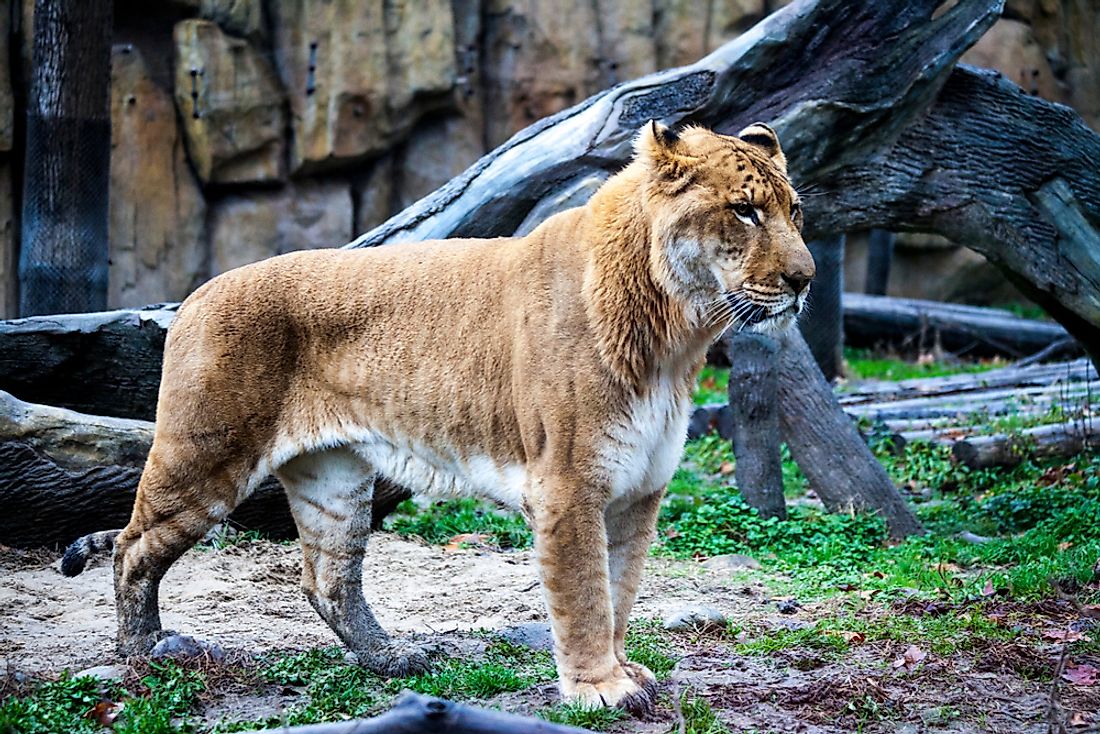Are Ligers Real?

Ligers are the result of crossbreeding a male lion and a female tiger. Although the two belongs to genus Panthera, they belong to separate species. The lion is of Leo species while the tiger is a Tigris. Ligers are usually larger and heavier than either of the parents. Ligers inherit different traits from the parents. They are good swimmers just like tigers and social like the lions. If the opposite happens, i.e. a female lion mates with a male tiger, then a Tigon is born. Ligers are larger than tigons.
Size and Growth of Ligers
Ligers are the largest known animal in the cat species in the world. Males can gain length of up to 11.8 feet and a weight of 900 pounds. Ligers have a tiger-like appearance with faint stripes against a background of tan color of the lion. Ligers are known to roar like the lions and chuff the way tigers do. Male ligers wear a modest mane with spots on the ears like those of tigers. Some ligers may have rosettes like those of lions. The underside is pale like that of a tiger with some spots. The appearance of a liger is determined by the actual subspecies of the parents and the interaction of genes in the offspring body. For example, if you cross breed a lion with a white tiger, the resulting liger cub will have a pale golden color.
Life Span of Ligers
The lifespan differs from a few weeks after birth to several years. In Hogle Zoo located in Salt Lake City, a liger was born on May 14, 1948, and died 24 years later in 1972. Other records of ligers are Hobbs who was reared in Sierra Safari zoo in Nevada. He died at the age of 15 years.
How Many Ligers Are There in World Today?
The United States of America has the highest number ligers (about 30) in the world. China has around 20 ligers while Germany, South Korea, South Africa, and Russia each have a few ligers. The total number of ligers in the world today do not exceed 100.
Why Are There Not Many Ligers?
Tigers and lions live in two separate ecosystems. Lions thrive in savanna grasslands, open woodlands, or in dense scrub only in Africa and Asia. Tigers, on the other hand, prefer dense, forested habitats near water bodies in Asia. The difference in habitats makes it difficult for the two to mate in the wild. Ligers are therefore mostly bred in captivity.
Animal rights crusaders, as well as various governments, do not support the breeding of the two animals. Most of the offsprings are born with birth defects which leads to early deaths. Those which survive may have abnormal growth leading to obesity. On the other hand, behavioral traits of ligers make it impossible for them to have a healthy interaction with other cats.
Misconceptions About Ligers
Some believe that ligers have continuous growth throughout their life attributed to hormones. That is a myth. The truth is that ligers take longer to reach maximum growth of adult size but will eventually reach optimum growth.
The second belief that was proved wrong was that ligers are sterile. In 1943, a 15-year-old liger gave birth after mating with a lion. It gave birth to a female cub in Munich Hellabrunn Zoo. Another birth by a liger was observed in 2012 in Novosibirsk Zoo in Russia.











